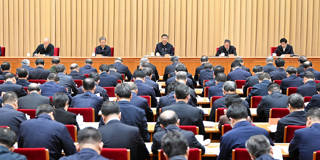Last month’s Central Financial Work Conference underscored areas where China’s central government should intervene to strengthen and stabilize the economy, from restoring local-government balance sheets to supporting innovation. But this does not mean that China is embracing greater economic centralization.
HONG KONG – Last month, China held its first Central Financial Work Conference – the highest-level review of the financial sector that the Communist Party of China (CPC) conducts – since 2017. Given that China’s financial sector includes the world’s largest banking system by assets ($53.1 trillion) – and the second-largest (after the United States) by stock-market capitalization – and that the full Politburo Standing Committee attends the conference, the decisions made, and even the tone struck, have global implications.
The report released after the conference confirmed that the CPC’s fundamental view of the financial sector has not changed. For China’s leaders, the fundamental function of finance is to serve the real economy, and the government is responsible for maintaining stability, managing risks, and promoting homegrown innovation and high-quality development.
But the focus of the discussions shifted significantly since 2017, when the main priority was managing the imbalances arising from shadow banking, local-government spending, and real-estate excesses. All of the risks in these domains had been exacerbated by the massive monetary and fiscal stimulus that China’s government implemented in the wake of the 2008 global financial crisis.

HONG KONG – Last month, China held its first Central Financial Work Conference – the highest-level review of the financial sector that the Communist Party of China (CPC) conducts – since 2017. Given that China’s financial sector includes the world’s largest banking system by assets ($53.1 trillion) – and the second-largest (after the United States) by stock-market capitalization – and that the full Politburo Standing Committee attends the conference, the decisions made, and even the tone struck, have global implications.
The report released after the conference confirmed that the CPC’s fundamental view of the financial sector has not changed. For China’s leaders, the fundamental function of finance is to serve the real economy, and the government is responsible for maintaining stability, managing risks, and promoting homegrown innovation and high-quality development.
But the focus of the discussions shifted significantly since 2017, when the main priority was managing the imbalances arising from shadow banking, local-government spending, and real-estate excesses. All of the risks in these domains had been exacerbated by the massive monetary and fiscal stimulus that China’s government implemented in the wake of the 2008 global financial crisis.